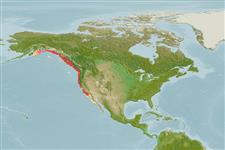Common names from other countries
>
Perciformes/Scorpaenoidei (Scorpionfishes) >
Sebastidae (Rockfishes, rockcods and thornyheads) > Sebastinae
Etymology: Sebastes: Greek, sebastes = august, venerable (Ref. 45335); elongatus: From the Latin elongatus, meaning 'elongate' (Ref. 27436).
More on author: Ayres.
Environment: milieu / climate zone / depth range / distribution range
Ecologia
marinhas demersal; intervalo de profundidade 25 - 425 m (Ref. 6793), usually 91 - 366 m (Ref. 6885). Temperate; 60°N - 27°N, 156°W - 114°W
Northeast Pacific: Chirikof Island in the Gulf of Alaska to Cedros Island, Baja California, Mexico.
Length at first maturity / Tamanho / Peso / Idade
Maturity: Lm 21.0, range 18 - ? cm
Max length : 39.0 cm TL macho/indeterminado; (Ref. 27437); peso máx. Publicado: 630.00 g (Ref. 40637); Idade máx. registada: 54 anos (Ref. 55701)
Espinhos dorsais (total): 13; Raios dorsais moles (total): 12-14; Espinhos anais 3; Raios anais moles: 6. Head spines strong - nasal, preocular, postocular, tympanic and parietal spines present, supraocular, coronal and nuchal spines absent (Ref. 27437). 2nd anal fin spine long; body slender (Ref. 27437). Pinkish yellow in color, with 3 or 4 horizontal green stripes on body, light ventrally; green streaks on caudal fin membranes (Ref. 27437).
A common inhabitant of both inshore and offshore areas (Ref. 2850, 6885). Found on rocky as well as soft bottoms (Ref. 2850). Viviparous (Ref. 34817). Only the largest individuals are filleted for human consumption, smaller ones are processed into fishmeal or used as animal feed (Ref. 27436). The flesh has a delicious flavor and appealing texture (Ref. 27436). Rarely caught by sports anglers, but an excellent bait for large lingcod (Ref. 27436). Rare appearances in public aquariums (Ref. 27436).
Lamb, A. and P. Edgell, 1986. Coastal fishes of the Pacific northwest. Madeira Park, (BC, Canada): Harbour Publishing Co. Ltd., 224 p. (Ref. 27436)
Categoria na Lista Vermelha da IUCN (Ref. 130435)
CITES (Ref. 128078)
Not Evaluated
Ameaça para o homem
Harmless
Utilização humana
Pescarias: espécies comerciais; Aquário: Aquários públicos; isco: usually
Mais informação
ReferênciasAquaculturaPerfil para aquaculturaEstirpesGenéticaElectrophoresesHereditariedadeDoençasProcessamentoMass conversion
ColaboradoresFotografiasStamps, Coins Misc.SonsCiguateraVelocidadeTipo de nataçãoÁrea branquialOutras referênciasCérebrosVisão
Ferramentas
Relatórios especiais
Descarregue XML
Fontes da internet
Estimates based on models
Preferred temperature (Ref.
115969): 5.7 - 8.8, mean 7 (based on 73 cells).
Phylogenetic diversity index (Ref.
82804): PD
50 = 0.5000 [Uniqueness, from 0.5 = low to 2.0 = high].
Bayesian length-weight: a=0.01000 (0.00499 - 0.02004), b=3.09 (2.92 - 3.26), in cm Total Length, based on LWR estimates for this Genus-body shape (Ref.
93245).
Nível Trófico (Ref.
69278): 3.7 ±0.5 se; based on size and trophs of closest relatives
Resiliência (Ref.
120179): Muito baixo, tempo mínimo de duplicação da população maior que 14 anos (tmax=46; tm=9).
Fishing Vulnerability (Ref.
59153): High vulnerability (63 of 100).
